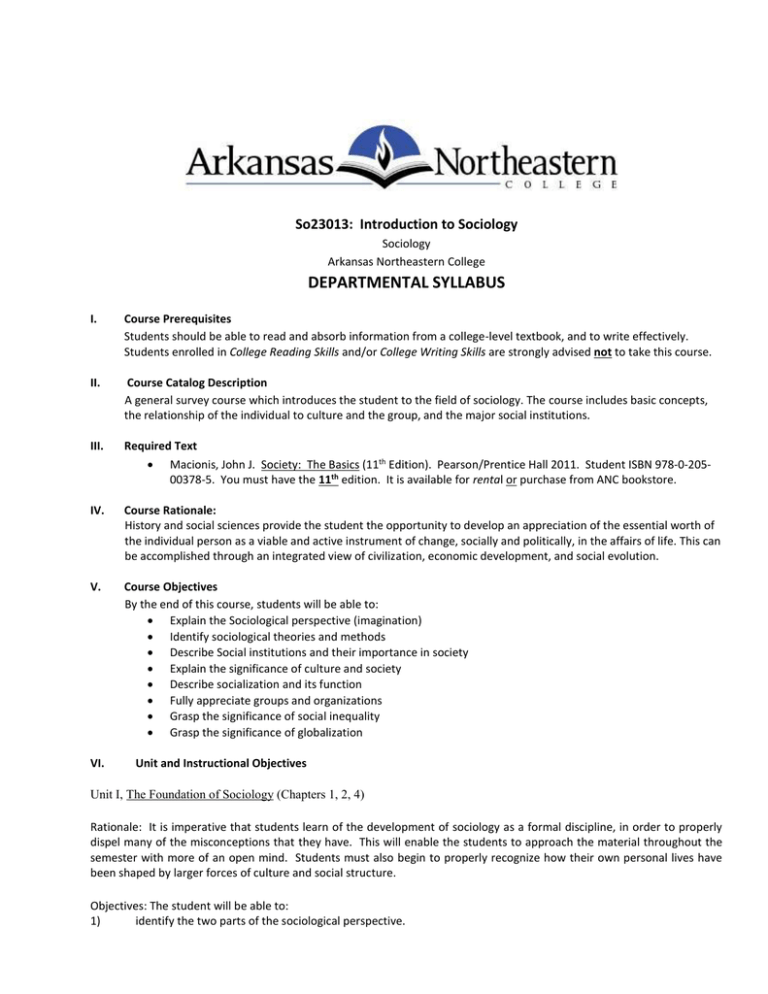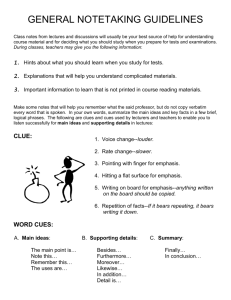
So23013: Introduction to Sociology
Sociology
Arkansas Northeastern College
DEPARTMENTAL SYLLABUS
I.
Course Prerequisites
Students should be able to read and absorb information from a college-level textbook, and to write effectively.
Students enrolled in College Reading Skills and/or College Writing Skills are strongly advised not to take this course.
II.
Course Catalog Description
A general survey course which introduces the student to the field of sociology. The course includes basic concepts,
the relationship of the individual to culture and the group, and the major social institutions.
III.
Required Text
Macionis, John J. Society: The Basics (11th Edition). Pearson/Prentice Hall 2011. Student ISBN 978-0-20500378-5. You must have the 11th edition. It is available for rental or purchase from ANC bookstore.
IV.
Course Rationale:
History and social sciences provide the student the opportunity to develop an appreciation of the essential worth of
the individual person as a viable and active instrument of change, socially and politically, in the affairs of life. This can
be accomplished through an integrated view of civilization, economic development, and social evolution.
V.
Course Objectives
By the end of this course, students will be able to:
Explain the Sociological perspective (imagination)
Identify sociological theories and methods
Describe Social institutions and their importance in society
Explain the significance of culture and society
Describe socialization and its function
Fully appreciate groups and organizations
Grasp the significance of social inequality
Grasp the significance of globalization
VI.
Unit and Instructional Objectives
Unit I, The Foundation of Sociology (Chapters 1, 2, 4)
Rationale: It is imperative that students learn of the development of sociology as a formal discipline, in order to properly
dispel many of the misconceptions that they have. This will enable the students to approach the material throughout the
semester with more of an open mind. Students must also begin to properly recognize how their own personal lives have
been shaped by larger forces of culture and social structure.
Objectives: The student will be able to:
1)
identify the two parts of the sociological perspective.
2)
3)
4)
5)
6)
7)
8)
9)
10)
11)
explain the scientific basis of sociology.
distinguish between the three theoretical approaches in sociology.
summarize various research methods employed by sociologists.
identify the various elements of culture.
distinguish between various types of cultural norms.
describe how subcultures and countercultures contribute to cultural diversity.
differentiate between ethnocentrism and cultural relativism.
identify the characteristics of social structure.
distinguish between different types of statuses and roles.
describe the main theories associated with the social construction of reality.
UNIT II The Power of Groups (Chapters 5, 6, 7)
Rationale: Students must be able to recognize how social groups impact every aspect of their lives in ways they may not
easily discern. This unit will allow students to explore group dynamics in formal organizations, the choices they make with
regard to sexuality, and their willingness to either obey or violate the rules of society.
Objectives: The student will be able to:
1)
identify the differences between primary and secondary groups.
2)
distinguish between types of group leadership.
3)
summarize the key research studies on conformity.
4)
identify the elements of the bureaucratic model.
5)
explain the problems associated with bureaucracy.
6)
explain the idea of the McDonaldization of Society.
7)
explain the biological and cultural factors associated with sexuality.
8)
summarize the sexual revolution and sexual counterrevolution.
9)
describe key research findings on several sexual controversies.
10)
identify how deviance is a product of society.
11)
summarize various sociological theories of deviance.
12)
describe the various elements of our criminal justice system.
Unit III Social Stratification and Social Institutions (Chapters 8, 10, 11, and 13)
Rationale: Students in the service area of Arkansas Northeastern College deal directly with social inequality, as well as the
institutions of family and religion, on a regular basis. This unit will give them a vocabulary to better articulate their
experiences and to recognize the potential for positive social change in their communities.
Objectives: The student will be able to:
1)
identify the principles of social stratification.
2)
describe the relationship between ideology and stratification.
3)
contrast the structural-functional and conflict approaches to stratification.
4)
identify and describe the various social classes in the United States.
5)
summarize competing theories on what causes poverty.
6)
describe the elements of welfare reform.
7)
explain how gender is a creation of society
8)
summarize the differences that gender makes in people’s lives.
9)
describe how gender is an important dimension of social stratification.
10)
explain how race is a socially constructed category.
11)
define and give examples of stereotypes associated with various racial/ethnic categories.
12)
describe various patterns of interaction between minorities and others within society.
13)
explain how prejudice is measured.
14)
differentiate between the terms prejudice and discrimination.
15)
describe how prejudice and discrimination operate together in a vicious circle.
16)
17)
18)
19)
20)
describe examples of institutional discrimination.
summarize the debate over whether Affirmative Action is still necessary.
define key terms associated with family and religion.
describe how family and religion are linked to social inequality.
explain why both family and religion are changing in today’s world.
VII.
Course Policies: Technology and Media
Email:
Arkansas Northeastern College has partnered with Google to host email addresses for ANC students. myANCmail
accounts are created for each student enrolled in the current semester and is the email address your instructor will
use to communicate with you. Access your email account by going to http://mail.google.com/a/smail.anc.edu and
using your first and last names, separated by a period for your username. Your default password is the last six
digits of your Student ID. If you cannot access your student email, contact the MITS department at 762-1020 ext
1150 or ext 1207 or send an email to ANChelp@smail.anc.edu.
Instructor will use email to communicate with class members on issues relevant to the class. Students are also
encouraged to use email to communicate with the instructor and each other. Students can expect the instructor
to respond to their emails within 24 hours. When possible, instructor does check and respond to emails on
weekends.
Internet: This course has a webpage on myANC.
Instructor will use the course webpage to post PowerPoint lectures, keep students apprised of important
announcements and dates, and receive video reports via electronic submissions. In addition, students will be able
to access scores on all coursework through the Gradebook tab.
Laptop Usage:
The use of laptops during class is prohibited.
Classroom Devices:
Students who wish to use tape recorders during lectures must receive permission from the instructor.
The use of cell phones, mp3 players, and IPods is strictly prohibited during class.
Computer Labs:
In addition to general-purpose classrooms, a number of computer laboratories are provided for
instructional and student use. These networked laboratories are state-of-the-art and fully equipped with
computers, printers, Internet connections and the latest software. The labs are open to students enrolled in one
or more credit hours at the College.
Technology Support:
A lab assistant is generally present in the computer lab in B202 for assistance in using the College computers.
These assistants cannot help you with course assignments; specific questions regarding the technology
requirements for each course should be directed to the instructor of the course. Problems with myANC or College
email accounts should be addressed by email to ANCHelp@smail.anc.edu.
VIII.
Course Policies: Student Expectations
Disability Access:
Arkansas Northeastern College is committed to providing reasonable accommodations for all persons with
disabilities. This First Day Handout is available in alternate formats upon request. Students with disabilities who
need accommodations in this course must contact the instructor at the beginning of the semester to discuss
needed accommodations. No accommodations will be provided until the student has met with the instructor to
request accommodations. Students who need accommodations must be registered with Dr. Blanche Sanders or
Suzanne Robinson at the Learning Assistance Center, Room L104.
Attendance Policy:
Instructor will take roll each class session. While no points are specifically assigned for attendance, it is imperative
that students make every effort to be in class on a regular basis.
If a student must miss a class, he/she should contact the instructor via email to explain what happened and to
determine what was missed. The student must get lecture notes that were missed from a classmate.
Professionalism Policy:
Please arrive on time and prepared for all class meetings. If you must come in late, do so without disrupting the
instructor or other students. Instructor will not tolerate repeated instances of tardiness.
Academic Conduct Policy:
Academic dishonesty in any form will not be tolerated. If you are uncertain as to what constitutes academic
dishonesty, please consult ANC’s Student Handbook (http://www.anc.edu/docs/anc_handbook.pdf) for further
details. Students are expected to do their own work. Plagiarism, using the words of others without express
permission or proper citation, will not be tolerated. Any cheating (giving or receiving) or other dishonest activity
will, at a minimum, result in a zero on that test or assignment and may be referred, at the discretion of the
instructor, to the Department Chair and/or Vice President of Instruction for further action.
Learning Assistance Center:
The Learning Assistance Center (LAC) is a free resource for ANC students. The LAC provides drop-in assistance,
computer tutorials and audio/visual aids to students who need help in academic areas. Learning labs offer
individualized instruction in the areas of mathematics, reading, writing, vocabulary development and college study
methods. Tutorial services are available on an individual basis for those having difficulty with instructional
materials. The LAC also maintains a shelf of free materials addressing specific problems, such as procedures for
writing essays and term papers, punctuation reviews, and other useful materials. For more information, visit the
LAC website at http://www.anc.edu/LAC or stop by room L104 in the Adams/Vines Library Complex.
Other Student Support Services:
Many departments are ready to assist you reach your educational goals. Be sure to check with your advisor; the
Learning Assistance Center, Room L104; Student Support Services, Room S145; and Student Success, Room L101 to
find the right type of support for you.




